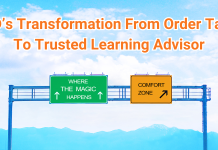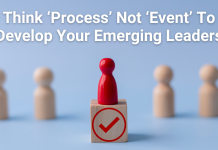
What can you learn from your favorite actors about remaining authentic?
Shakespeare famously said: “All the world’s a stage.” Common sense says that we don’t reveal every side of ourselves in every situation–but how can we share different sides of ourselves and keep things real at the same time?
Michael Port was once a professional actor, having received his MFA from NYU's prestigious graduate acting program. He guest starred on shows like Sex and the City and Law and Order; more recently you may have seen him offering communication advice on MSNBC, CNBC, and PBS. He is a New York Times best-selling author of six books, including, “Book Yourself Solid,” and, “Steal the Show.”
I recently interviewed Michael to get his perspective on using authenticity to your advantage. (The transcript below has been edited lightly for space and clarity.)
Kevin Kruse: Authenticity is a hot topic, but you talk about playing a role, how to act. How do you reconcile the two?
Michael Port: If you think about life, it seems that life is made up of a series of high stakes situations, among other, more mundane and pedestrian activities. How you perform during those high-stake situations will often determine the quality of your life. If you fall flat when the spotlight's on you, not much happens. if you can shine, if you can take the stage, so to speak, when the spotlight's on you. Well, then you can do big things in the world.
This idea of authenticity, I think is bending about quite often. It's become a bit of a buzz word. Often when people are told, when people are given advice on public speaking or performance, they're just told to be themselves. That's not always really easy advice to act on, because which part of yourself should you be? I think we're more than one thing. We have more than one way of being.
The way that I interact with my friends from high school, it's a little bit different than the way that I interact with the people on the board of a company that I sit on. I have a different role as a father to my children than I do when I'm a guest on a podcast. I have a different role with my staff than I do when I'm with my clients, or my students. Every single person gets a different part of me that's uniquely me.
No one's every going to say, “Oh, I didn't recognize that Michael.” My role is different; my responsibilities in that role are different. If we can identify what our responsibilities are in a role, then we know what role … In a given situation then we know what role to play in any given situation. We can then be a lot more fluid. We can move in and out of different groups easily, move in and out of different situations easily. It gives us access to so much more.
Kruse: I can see how that would really open up a lot of opportunities.
Port: People often get constrained by their idea of themselves. They will say, “Well I do that, I don't do that. I am this, I am not that.” Without even trying the things that they say they are not. What I'm asking is I'm asking folks to think a little bit more like a performer. A performer is playing different roles all the time, that's what they do. The best performers in the world do so authentically. If you think about Tom Hanks. When Tom Hanks plays Sully in the movie about the airplane pilot who landed the plane in the Hudson River, he's playing a different role than when he plays Captain Philips in the movie about the ship captain who was kidnapped by pirates.
But each role is played authentically. He's bringing a different part of his personality to those roles. The reason you like him so much is because he's so honest. You believe him so sincerely. He doesn't think he's those people, he's not insane. He doesn't actually think he's Captain Philips, but he is so committed to the objectives that, that character has, that he tries every tactic he can possibly think of to achieve those objectives. As a result, his character as written by the film maker, achieves those objectives.
The same thing is true in life. If you're clear n what your objectives are, and you're willing to try any tactic you can possibly think of within your moral and ethical value system, then you might find there's different ways of behaving. You're not pretending to be something than you are, you're just playing different roles given what's needed in that particular situation, and they're all authentic.
Kruse: Based on your experience as an actor going to auditions, you say we shouldn’t care what the casting director is looking for. Why?
Port: When I was an actor I was very concerned with what other people wanted. When I'd get a script I'd look at it and think, “Well, what do you think they're looking for here? What does the casting director want? What's the director want, what's the producer want?” As a result I'd go in not making strong choices. I'd make choices that I think were safe choices based on what they wanted. The performer’s job is to break the rules by making big choices. Not break the rules just to be rebellious, but to do things that people might not even have thought of doing.
That's what entrepreneurs do, that's what creative artists do, it's what inventors do, it's what authors do. Trying to do things in ways that have not been done before, that might even seem like they're impossible, or things that you wouldn't normally expect. I found it didn't work very well. It wasn’t until I went into business for myself later on, when I realized that what I should have done is go in there and make very strong choices, show the casting director what they're looking for.
Now, that doesn't mean you don't think about what other people are looking for, you absolutely do. Sometimes you're going to find what they're looking for is not actually what they need. One of the jobs that I applied for when I left acting was for a position for which I was completely unqualified. I had absolutely no business applying for this job because I had none of the qualifications, none of the experience, and none of the certifications that they thought were appropriate. I got myself in for an interview, I talked my way into it through networking. I said, “Listen, I know that I don't have any of the qualifications that you think you need. I don't have any of the certifications that you traditionally look for. I don't have the experience that you think I should have. Let me tell you why I think you're looking for the wrong thing.”
Now, what do I have to lose? I don't have the job, so all I have to lose is them saying, “Dude, who the hell are you? Get out of my office.” The reward for taking the big chance, and making the big choice, was significant. I was able to present it in such a way that they went, “Huh, I think that's right. I'm going to take a chance on you.” I had a very strong case about why I thought they were looking for the wrong type of person for that particular role. That one worked out. There are other times when things aren't going to work out. The key is you making the strong choice. You going in there, and you laying the ground work, you setting the path, you blazing a trail.
Kruse: What's something really practical that you can challenge our readers with?
Port: I think that each day if you can choose one thing to do that makes you uncomfortable, and do it anyway, you're likely to do big things in the world. Choose just one thing that makes you uncomfortable to do every day, and you'll do big things in the world.
—
Click here to listen to the full interview with Michael Port.





